小学一般将来时讲解
- 格式:doc
- 大小:30.00 KB
- 文档页数:4
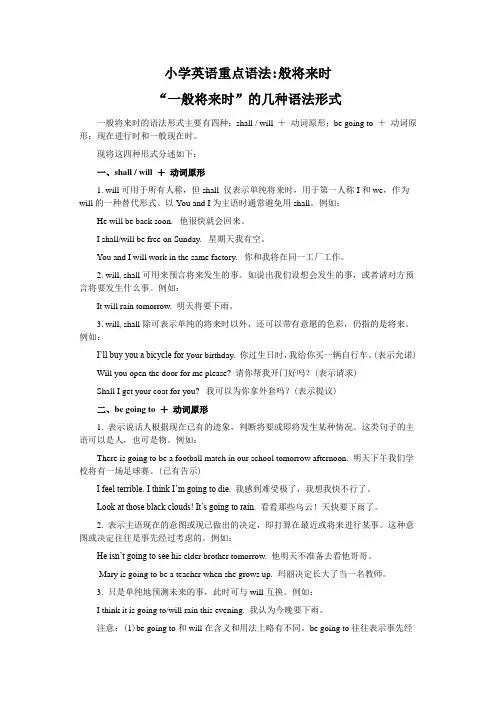
小学英语重点语法:般将来时“一般将来时”的几种语法形式一般将来时的语法形式主要有四种:shall / will +动词原形;be going to +动词原形;现在进行时和一般现在时。
现将这四种形式分述如下:一、shall / will +动词原形1. will可用于所有人称,但shall 仅表示单纯将来时,用于第一人称I和we,作为will的一种替代形式。
以You and I为主语时通常避免用shall。
例如:He will be back soon. 他很快就会回来。
I shall/will be free on Sunday. 星期天我有空。
You and I will work in the same factory. 你和我将在同一工厂工作。
2. will, shall可用来预言将来发生的事。
如说出我们设想会发生的事,或者请对方预言将要发生什么事。
例如:It will rain tomorrow. 明天将要下雨。
3. will, shall除可表示单纯的将来时以外,还可以带有意愿的色彩,仍指的是将来。
例如:I’ll buy you a bicycle for y our birthday. 你过生日时,我给你买一辆自行车。
(表示允诺)Will you open the door for me please? 请你帮我开门好吗?(表示请求)Shall I get your coat for you? 我可以为你拿外套吗?(表示提议)二、be going to +动词原形1. 表示说话人根据现在已有的迹象,判断将要或即将发生某种情况。
这类句子的主语可以是人,也可是物。
例如:There is going to be a football match in our school tomorrow afternoon. 明天下午我们学校将有一场足球赛。
(已有告示)I feel terrible. I think I’m going to die. 我感到难受极了,我想我快不行了。
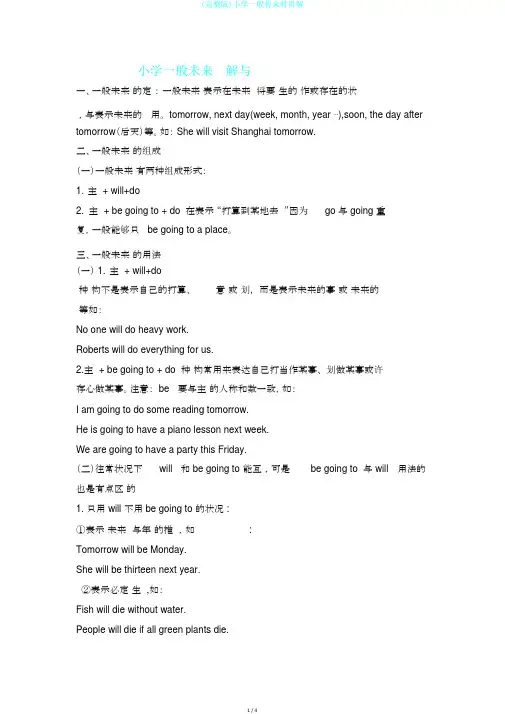
小学一般未来解与一、一般未来的定:一般未来表示在未来将要生的作或存在的状,与表示未来的用。
tomorrow, next day(week, month, year ⋯),soon, the day after tomorrow(后天)等。
如: She will visit Shanghai tomorrow.二、一般未来的组成(一)一般未来有两种组成形式:1.主 + will+do2.主 + be going to + do 在表示“打算到某地去”因为 go 与 going 重复,一般能够只 be going to a place。
三、一般未来的用法(一) 1.主 + will+do种构不是表示自己的打算、意或划,而是表示未来的事或未来的等如:No one will do heavy work.Roberts will do everything for us.2.主 + be going to + do 种构常用来表达自己打当作某事、划做某事或许存心做某事。
注意: be 要与主的人称和数一致,如:I am going to do some reading tomorrow.He is going to have a piano lesson next week.We are going to have a party this Friday.(二)往常状况下will和be going to能互,可是be going to 与 will用法的也是有点区的1. 只用 will 不用 be going to 的状况 :①表示未来与年的推,如:Tomorrow will be Monday.She will be thirteen next year.②表示必定生 ,如:Fish will die without water.People will die if all green plants die.2.只用 be going to 而不用 will 的状况:假如表示已有迹象表示在不久的未来要发生的事情时,如:Look at those black clouds, It’ s going to rain.(三)某些动词如: go/come/leave/start/begin/arrive等,它们的此刻进行时能够表示未来时,如:They are leaving for Shanghaitomorrow.My brother is coming here soon.四、一般未来时的句式变换一定句:主语 + will+do主语 + be going to + do否认句:主语 + will+not+do (will not可缩写成won’t)主语 + be+ not+ going to +do一般疑问句:will+ 主语 + dobe+主语 +going to+do特别疑问句:疑问词 + will+ 主语 +do疑问词 +be+主语 +going to+do五.稳固练习一、按要求填空1.我打算明日和朋友去野炊。
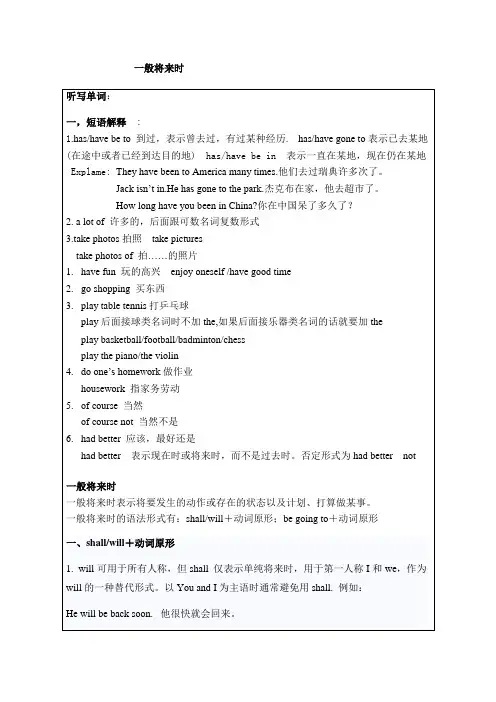
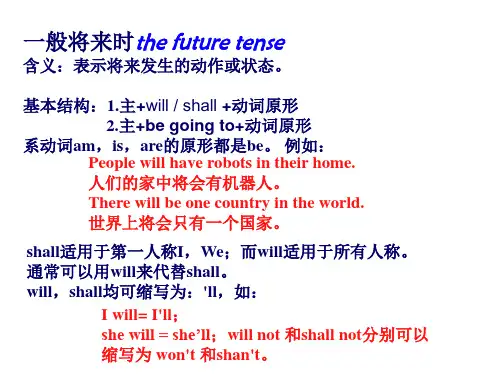
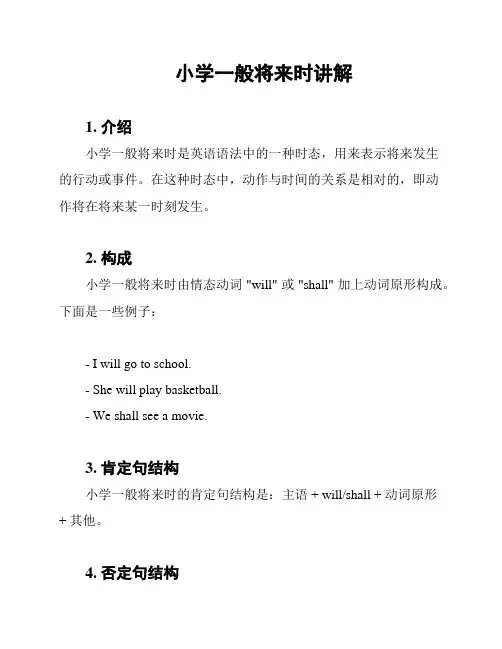
小学一般将来时讲解1. 介绍小学一般将来时是英语语法中的一种时态,用来表示将来发生的行动或事件。
在这种时态中,动作与时间的关系是相对的,即动作将在将来某一时刻发生。
2. 构成小学一般将来时由情态动词 "will" 或 "shall" 加上动词原形构成。
下面是一些例子:- I will go to school.- She will play basketball.- We shall see a movie.3. 肯定句结构小学一般将来时的肯定句结构是:主语 + will/shall + 动词原形+ 其他。
4. 否定句结构小学一般将来时的否定句结构是:主语 + will/shall + not + 动词原形 + 其他。
5. 疑问句结构小学一般将来时的疑问句结构是:Will/Shall + 主语 + 动词原形+ 其他?6. 使用场景小学一般将来时常用于以下场景:- 表示未来的计划或打算:I will go to the park tomorrow.- 表示预测:It will rain later.- 表示意愿或请求:Will you help me with my homework?7. 注意事项在小学一般将来时中,我们要注意以下几点:- 不使用"will"或"shall"来表达对他人的承诺或决定,如"I promise"或"I decide"。
- 在口语中,经常使用"will"而不是"shall"。
- 在第一人称疑问句中,我们可以使用"shall"代替"will",但这并不常见。
希望这份文档对你的小学一般将来时的学习有所帮助!。
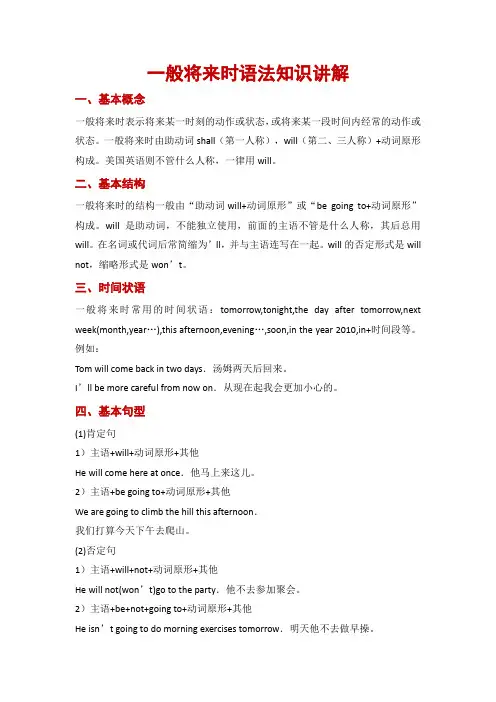
一般将来时语法知识讲解一、基本概念一般将来时表示将来某一时刻的动作或状态,或将来某一段时间内经常的动作或状态。
一般将来时由助动词shall(第一人称),will(第二、三人称)+动词原形构成。
美国英语则不管什么人称,一律用will。
二、基本结构一般将来时的结构一般由“助动词will+动词原形”或“be going to+动词原形”构成。
will是助动词,不能独立使用,前面的主语不管是什么人称,其后总用will。
在名词或代词后常简缩为’ll,并与主语连写在一起。
will的否定形式是will not,缩略形式是won’t。
三、时间状语一般将来时常用的时间状语:tomorrow,tonight,the day after tomorrow,next week(month,year…),this afternoon,evening…,soon,in the year 2010,in+时间段等。
例如:Tom will come back in two days.汤姆两天后回来。
I’ll be more careful from now on.从现在起我会更加小心的。
四、基本句型(1)肯定句1)主语+will+动词原形+其他He will come here at once.他马上来这儿。
2)主语+be going to+动词原形+其他We are going to climb the hill this afternoon.我们打算今天下午去爬山。
(2)否定句1)主语+will+not+动词原形+其他He will not(won’t)go to the party.他不去参加聚会。
2)主语+be+not+going to+动词原形+其他He isn’t going to do morning exercises tomorrow.明天他不去做早操。
(3)一般疑问句1)Will+主语+动词原形+其他?Will he help you with your English?他会帮助你学习英语吗?2)Be动词(Am,Is,Are)+主语+going to+动词原形+其他?Are you going to play computer games tomorrow afternoon?你打算明天下午玩电脑游戏吗?(4)特殊疑问句:疑问词+一般疑问句?—What will the students have for lunch today?学生们今天午饭吃什么?—They will have bread.他们将吃面包。
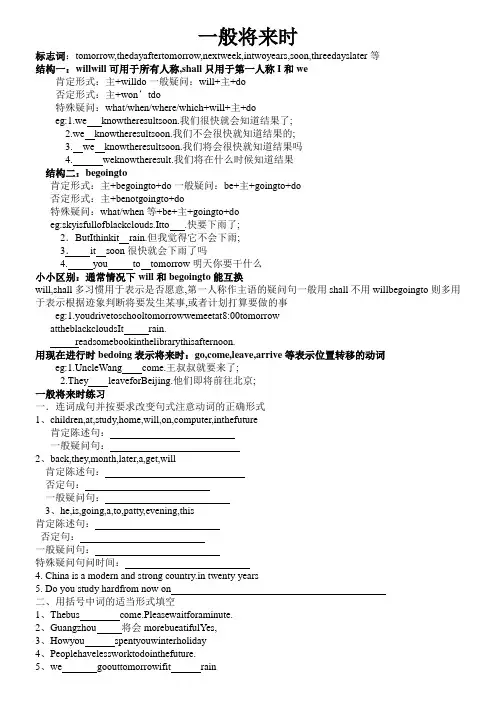
一般将来时标志词:tomorrow,thedayaftertomorrow,nextweek,intwoyears,soon,threedayslater等结构一:willwill可用于所有人称,shall只用于第一人称I和we肯定形式:主+willdo一般疑问:will+主+do否定形式:主+won’tdo特殊疑问:what/when/where/which+will+主+doeg:1.we knowtheresultsoon.我们很快就会知道结果了;2.we knowtheresultsoon.我们不会很快就知道结果的;3. we knowtheresultsoon.我们将会很快就知道结果吗4. weknowtheresult.我们将在什么时候知道结果结构二:begoingto肯定形式:主+begoingto+do一般疑问:be+主+goingto+do否定形式:主+benotgoingto+do特殊疑问:what/when等+be+主+goingto+doeg:skyisfullofblackclouds.Itto .快要下雨了;2.ButIthinkit rain.但我觉得它不会下雨;3.it soon很快就会下雨了吗4. you to tomorrow明天你要干什么小小区别:通常情况下will和begoingto能互换will,shall多习惯用于表示是否愿意,第一人称作主语的疑问句一般用shall不用willbegoingto则多用于表示根据迹象判断将要发生某事,或者计划打算要做的事eg:1.youdrivetoschooltomorrowwemeetat8:00tomorrowattheblackcloudsIt rain.readsomebookinthelibrarythisafternoon.用现在进行时bedoing表示将来时:go,come,leave,arrive等表示位置转移的动词eg:1.UncleWang come.王叔叔就要来了;2.They leaveforBeijing.他们即将前往北京;一般将来时练习一.连词成句并按要求改变句式注意动词的正确形式1、children,at,study,home,will,on,computer,inthefuture肯定陈述句:一般疑问句:2、back,they,month,later,a,get,will肯定陈述句:否定句:一般疑问句:3、he,is,going,a,to,patty,evening,this肯定陈述句:否定句:一般疑问句:特殊疑问句问时间:4. China is a modern and strong country.in twenty years5. Do you study hardfrom now on二、用括号中词的适当形式填空1、Thebus come.Pleasewaitforaminute.2、Guangzhou 将会morebueatifulYes,3、Howyou spentyouwinterholiday4、Peoplehavelessworktodointhefuture.5、we goouttomorrowifit rain三、选择正确的答案1. Thereanimportantmeetingnextweek.A.willbeB.willhaveC.willhasD.willgoingtobe2. toEnglandtomorrow.A.flyB.flewC.isflyingD.flies3. Marywillcomebackfiveo’ter4. yougototheparktomorrowA.WillB.ShallC.DoD.Are5. . The day after tomorrow they ________ a volleyball match.A. will watchingB. watchesC. is watchingD. is going to watch6. .There ________ a birthday party this Sunday.A. shall beB. will beC. shall going to beD. will going to be7. They ________ an English evening next Sunday.A. are havingB. are going to haveC. will havingD. is going to have8. ________ you ________ free next Sunday A. Will; areB. Will; be C. Do; be D. Are; be9. He ________ there at ten tomorrow morning. A. willB. Is C. will beD. be10. ________ your brother ________ a magazine from the libraryA. Are; going to borrowB. Is; going to borrowC. Will; borrowsD. Are; going to borrows作业:一、单项选择;1. There __________ a meeting tomorrow afternoon.A. will be going toB. will going to beC. is going to beD. will go to be2. Charlie ________ here next month.A. isn’t workingB. doesn’t workingC. isn’t going to workingD. won’t work3. He ________ very busy this week, he ________ free next week.A. will be; isB. is; isC. will be; will beD. is; will be4. There ________ a dolphin show in the zoo tomorrow evening.A. wasB. is going to haveC. will haveD. is going to be5.–________ you ________ free tomorrow – No. I ________ free the day after tomorrow.A. Are; going to; willB. Are; going to be; willC. Are; going to; will beD. Are; going to be; will be6. Mother ________ me a nice present on my next birthday.A. will givesB. will giveC. givesD. give7. – Shall I buy a cup of tea for you–________. 不,不要;A. No, you won’t.B. No, you aren’. No, please don’t.D. No, please.8. – Where is the morning paper – I ________ if for you at once.A. getB. am gettingC. to getD. will get二、动词填空;1. I ______leavein a minute. I ______finishall my work before I ______ leave.2. —How long _____ you _____studyin our country—I _____planto be here for about one more year.—What ______ you ______doafter you ______leavehere—I ______returnhome and ______geta job.3. I ______betired. I ______goto bed early tonight.4. Mary’s birthday is next Monday, her mother _____giveher a present.三、句型转换;1. People in the north often go skating in winter. next winter2. There are two cinemas in that town. next year3. He comes back late.in two days4.She is a conductor of a train.soon。
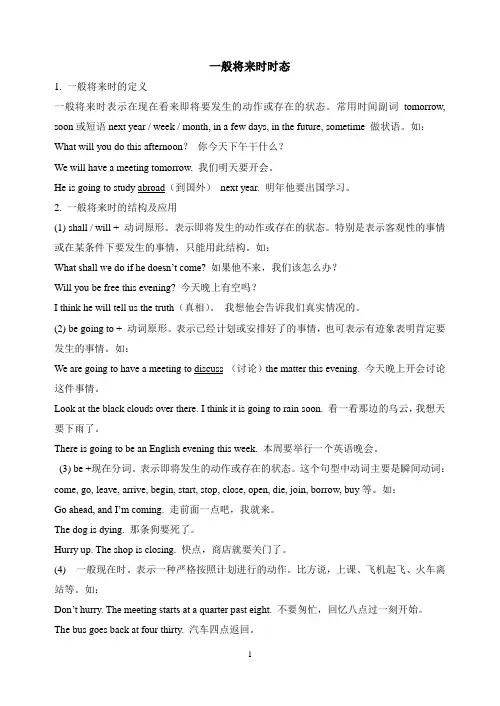
一般将来时时态1. 一般将来时的定义一般将来时表示在现在看来即将要发生的动作或存在的状态。
常用时间副词tomorrow, soon或短语next year / week / month, in a few days, in the future, sometime 做状语。
如:What will you do this afternoon?你今天下午干什么?We will have a meeting tomorrow. 我们明天要开会。
He is going to study abroad(到国外)next year. 明年他要出国学习。
2. 一般将来时的结构及应用(1) shall / will + 动词原形。
表示即将发生的动作或存在的状态。
特别是表示客观性的事情或在某条件下要发生的事情,只能用此结构。
如:What shall we do if he doesn’t come? 如果他不来,我们该怎么办?Will you be free this evening? 今天晚上有空吗?I think he will tell us the truth(真相)。
我想他会告诉我们真实情况的。
(2) be going to + 动词原形。
表示已经计划或安排好了的事情,也可表示有迹象表明肯定要发生的事情。
如:We are going to have a meeting to discuss (讨论)the matter this evening. 今天晚上开会讨论这件事情。
Look at the black clouds over there. I think it is going to rain soon. 看一看那边的乌云,我想天要下雨了。
There is going to be an English evening this week. 本周要举行一个英语晚会。
(3) be +现在分词。
表示即将发生的动作或存在的状态。
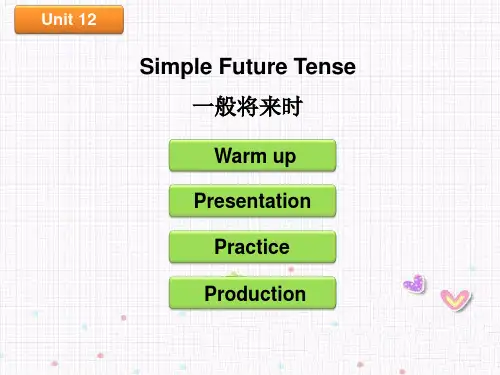
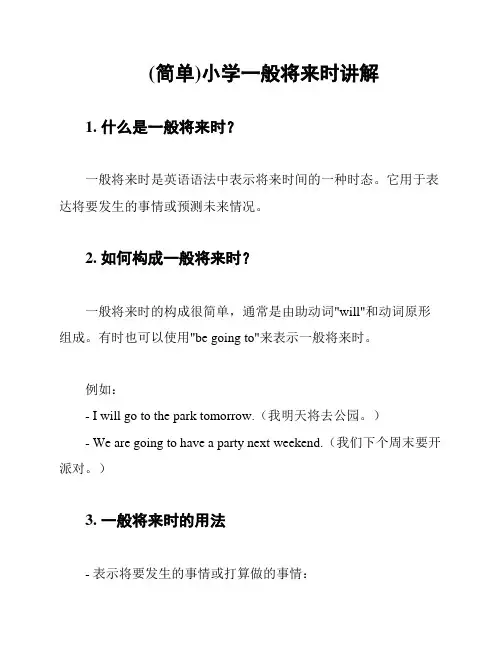
(简单)小学一般将来时讲解1. 什么是一般将来时?一般将来时是英语语法中表示将来时间的一种时态。
它用于表达将要发生的事情或预测未来情况。
2. 如何构成一般将来时?一般将来时的构成很简单,通常是由助动词"will"和动词原形组成。
有时也可以使用"be going to"来表示一般将来时。
例如:- I will go to the park tomorrow.(我明天将去公园。
)- We are going to have a party next weekend.(我们下个周末要开派对。
)3. 一般将来时的用法- 表示将要发生的事情或打算做的事情:- I will call you later.(我等会儿给你打电话。
)- They will have a meeting tomorrow.(他们明天要开会。
)- 表示预测或猜测未来情况:- It will rain this afternoon.(今天下午会下雨。
)- She will probably pass the exam.(她很可能会通过考试。
)- 用于表示意愿、请求、建议、命令等:- Will you help me with my homework, please?(请你帮我做作业好吗?)- You will do as I say.(你要按我说的去做。
)4. 注意事项- 一般将来时通常不能与表示明确的时间状语连用,如"tomorrow"、"next week"等。
- 在第一人称中,可以使用"shall"代替"will",但这在现代英语中很少使用。
- 使用"be going to"时,一般是根据现有迹象进行预测或计划。
5. 例句- She will study abroad next year.(她明年将出国留学。
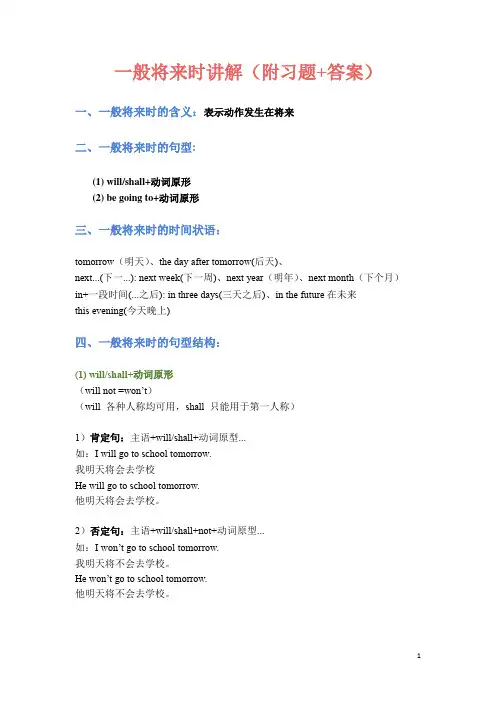
一般将来时讲解(附习题+答案)一、一般将来时的含义:表示动作发生在将来二、一般将来时的句型:(1) will/shall+动词原形(2) be going to+动词原形三、一般将来时的时间状语:tomorrow(明天)、the day after tomorrow(后天)、next...(下一...): next week(下一周)、next year(明年)、next month(下个月)in+一段时间(...之后): in three days(三天之后)、in the future在未来this evening(今天晚上)四、一般将来时的句型结构:(1) will/shall+动词原形(will not =won’t)(will 各种人称均可用,shall 只能用于第一人称)1)肯定句:主语+will/shall+动词原型...如:I will go to school tomorrow.我明天将会去学校He will go to school tomorrow.他明天将会去学校。
2)否定句:主语+will/shall+not+动词原型...如:I won’t go to school tomorrow.我明天将不会去学校。
He won’t go to school tomorrow.他明天将不会去学校。
3)一般疑问句:Will/Shall +主语+动词原型...如:Will you go to school tomorrow?你明天要去学校吗?Will he go to school tomorrow?他明天要去学校吗?肯定回答:Yes, 主语+will.如:Yes, I will.Yes, he will.否定回答:No,主语+will+not.如:No, I won’t.No, he won’t.4) 特殊疑问句:特殊疑问词+will/shall+主语+动词原型...如:What will you do tomorrow?你明天将会做什么?What will he do tomorrow?他明天将会做什么?(2) be going to+动词原形1)肯定句:主语+be going to +动词原型...如:I am going to buy some books tomorrow.我明天打算去买一些书。
一般将来时一、一般将来时的定义一般将来时表示在现在看来即将要发生的动作或存在的状态..常用时间副词tomorrow; soon或短语next year / week / month; in a few days; in the future; sometime 做状语..如:What will you do this afternoon. 你今天下午干什么We will have a meeting tomorrow. 我们明天要开会..He is going to study abroad next year. 明年他要出国学习..二、一般将来时的基本用法及构成一般将来时的基本用法是表示单纯的将来事实;由“will / shall + 动词原形”构成:We shall have a lot of rain next month. 下个月将下很多雨..I think she will pass the exam. 我想他考试会及格的..三、表示将来时间的几种常见方法英语中除了“will /shall+动词原形”表示半来时态外;还可以有以下多种方法:1用“be going to+动词原形”表示..主要表示打算和预测:We are not going to stay there long. 我们不准备在那里多待..表打算I’m afraid they’re going to lose the game.恐怕他们会赛输..表预测Look; it’s going to rain.瞧;要下雨了..表预见注:be going to 后接动词go和come时;通常直接改用其进行时态:Where is he going to go / Where is he going 他打算到哪里去2用“be to+动词原形”表示..主要表示按计划或安排即将要发生的动作;有时也表示命令、禁止或可能性:He is to leave for Beijing tomorrow. 他决定明天去北京..Tell him he’s not to be back late. 告诉他不准迟回..3用“be about to+动词原形”表示..主要表示即将要发生的事:He is about to leave. 他即将要离开..Sit down; everyone. The film is about to start. 大家坐好;电影马上就要开发始了..注:该结构通常不与具体的时间状语连用:误:He is about to leave soon tomorrow.另外;该结构在美国英语中还可表示“打算”主要用于否定句:I’m not about to lend him any more money.我不打算再借给他任何钱..4用“be due to+动词原形”表示..主要表示按计划或时间表将要发生某事:He is due to leave very soon. 他很快就要离开..His book is due to be published in October. 他的书计划10月份出版..5用“现在进行时”即be+现在分词表示..主要表示按计划或安排要发生的事:The students are leaving on Sunday. 学生们星期日出发..We’re having a party next week.我们下星期将开一个晚会..注:该用法有时表示即将发生的动作:I’m leaving.我走了..6用“一般现在时”表示..表示按规定或时间表预计要发生的事:The train leaves at 7:25 this evening. 火车今晚7:25分开..Tomorrow is Wednesday. 明天是星期三..We have a holiday tomorrow. 我们明天放假..注:在表示时间、条件等的状语从句以及某些名词性从句、定语从句等中;也用一般现在时表示将来意义;参见“时态详解:一般现在时”的有关用法..四、三种将来时间表示法的比较1 “will / shall+动词原形”与“be going to+动词原形”两者均可表示将来时间和意图;两者有时可换用:I think it’ll rain this evening. / I think it’s going to rain this evening. 我想今晚会下雨..I won’t tell you about it. / I’m not going to tell you about it. 我不会把这事告诉你的..但有时有差别:①若是强调某个意图是经过事先考虑好的;则通常要用be going to;若是表示某个意图没有经过事先考虑;而是在说话的当时才临时想到的;则通常用will..比较:"Ann is in hospital." "Oh; really I didn’t know. I’ll go and visit her." “安住院了..”“啊;真的吗我还不知道..我要去看看她..” 临时想法;不能用be going to"Ann is in hospital." "Yes; I know. I’m going to visit her tomorrow. “安住院了..”“我知道;我打算明天去看看她..” 事先考虑的意图;不能用will②若是有迹象表明要发生某事;通常只用be going to;不用will:Look at those black clouds. It’s going to rain.看那些乌云;要下雨了..③带有时间或条件状语从句的主句通常不宜用be going to;而用will:When he comes back; I will tell him the news. 他回来时我就告诉他这个消息..If he comes back; I will tell him the news. 他若回来我就告诉他这个消息..2“be going to+动词原形”与“现在进行时”① be going to主要表示主观想法或意图;而现在进行进表示将来则主要已经强调作出的安排..比较:I’m going to wash the car if I have time.若有时间我想洗洗车..主观想法I’m picking you up at 6; don’t forget.我6点钟来接你;不要忘了..已作出的安排②但是当要表示主观无法控制的预测时;通常要用be going to;不能用现在进行时态:It’s going to snow before long.不久会下雪..Things are going to get better soon. 情况很快就会好起来..③当表示坚持要不要某人做某事时;两者均可用:She’s taking going to take that medicine whether he likes it or not. 不管她喜欢不喜欢;她都得吃那药..You’re not wearing going to wear that skirt to school. 你不可以穿那条裙子去上学..3 “be going to+动词原形”与“be to+动词原形”的区别两者均可表示按计划或安排要发生的动作;有时可互换但be to比be going to正式:Where are we going to stay tonight 我们今晚住哪里I’m going to play tennis this afternoon.我打算今天下午打网球..另外;be going to 还可表示预测;即根据已有迹象预测将要发生的动作;此时不能用be to:Look; it’s going to rain.看;要下雨了..五、典型一般将来时考题详解例1Turn on the television or open a magazine and you __________ advertisements showing happy familiesA.will often seeB.often seeC.are often seeingD.have often seen分析:A..这是“祈使句+and +陈述句”句型;祈使句相当于一个条件状语从句;and后的陈述句的谓语用一般将来时;这是一个较为固定的句型..例2He was hoping to go abroad but his parents __________ that they won’t support him unless he can borrow money from the bank.A. were decidingB. have decidedC. decidedD. will decide分析:B..因宾语从句中的时态是一般将来时;主句中的谓语动词不可能是过去时态;排除选项A和D; 由语境判断;不是“将要决定”;而是“现在已经决定”;所以排除D;而选B..例3—How can I apply for an online course—Just fill out this form and we __________ what we can do four you.A. seeB. are seeingC.have seenD.will see分析:D..表示将要发生的情况;自然是用一般将来时..例4If their marketing plans succeed; they _________their sales by 20 percent.A. will increaseB. have been increasingC. have increasedD. would be increasing分析:A..由于if条件从句用的是一般现在时;所以其相应的主句宜用一般将来时..例5Population experts predict that most people _________ in cities in the near future.A. liveB. would liveC. will liveD. have lived分析:C..根据句中的in the near future可知要用一般将来时..例6When I talked with my grandma on the phone; she sounded weak; but by the time we ________ up; her voice had been full of life.A.were hangingB.had hungC.hungD.would hang分析:C..从逻辑上说;当我在电话里和奶奶聊天时;她的声音听起来很虚弱;但到我们要挂电话时;她的声音又充满朝气..从逻辑上说;应该是“奶奶的声音又充满朝气”在先;“我们挂断电话”在后;如果是反过来的话;那说话者就无法听知道“奶奶的声音又充满朝气”之回事了..所以“挂断电话”应用一般过去时..另外;由于by the time后接的定语从句通常要用一般现在时代替一般将来时;用一般过去时代替过去将来时;所以选项D不能选..例7—Ann is in hospital.—Oh; really I ________ know. I ________ go and visit her.A.didn’t; am going toB.don’t;wouldC.don’t; willD.didn’t; will分析:D..根据句意;在此之前说话人不知道安住院了;因此第一空用一般过去时;说话人打算去看她;这个动作还没发生;因此第二空用一般将来时..注意be going to与will表示将来的区别:表示临时的决定;要用begoing to;不用 will.yygrammar..例8I’ll go to the library as soon as I finish what I______.A.was doingB.am doingC. have doneD. hadbeen doing分析:B..句意是:我一完成我做的工作就去图书馆..由于“去图书馆”用的是一般将来时;说明要完成的工作是“现在”正在做的事情;故用现在进行时..又如:He is studying architecture. 他在学习建筑..The ambulance is carrying wounded people to the nearest hospital. 救护车正在把受伤的人送到最近的医院..一般过去时一、一般过去时的定义一般过去时表示过去某一时候或某一段时间所发生了的事情或存在的状态..常与过去时间yesterday; this morning; just now; a moment ago; in May; last night / year / week; once upon a time; the other day; in the past 等连用..如:What did you do yesterday 昨天你干了什么I met Lin Tao this morning. 今天上午我会到了林涛..I was there a moment ago. 刚才我在那儿..二、一般过去时的应用1. 一般过去时表示过去1表示过去发生的动作或存在的状态:He bought the computer five years ago. 这电脑是他五年前买的..It was then a small fishing village.那时它只是一个小渔村..2表示过去经常性或习惯性的动作:We often played together when we were children.我们小时候常在一起玩..注:表过去习惯性的动词;也可用used to或would:He used to go to work by bus. 他过去常乘公共汽车去上班..2. 一般过去时表示现在1在宾语从句中;由于时态呼应的关系;可用一般过去时表示现在:I didn’t know you were here.我不知道你在这儿..were实际上指现在I didn’t know you were so busy.我没想到你这么忙..were实际上指现在2表示客气委婉的现在I wondered if you were free this evening. 不知您今晚是否有空..I thought you might like some flowers. 我想您也许想要些花..注:能这样有的动词主要限于want; wonder; think; hope; intend 等少数动词..3用于某些特殊结构中表示现在It’s time we started.我们该动身了..I wish I knew his him. 要是我知道他的名字就好了..I’d rather you lived closer to us.我希望你能住得离我们近点..注:该用法主要用于it’s time; I wish; I’d rather; if only; as if; as though 等少数结构后接从句的情形;其中有些结构后面的句子还可用一般过去时表示将来:I’d rather you come next Monday.我宁愿你下周星期一来..另外表主观想法的虚拟条件句也用一般过去时表示现在:If I h ad the money now I’d buy a car.假若我现在有钱;我就买辆小汽车..三、一般过去时对谓语动词的要求一般过去时的谓语动词要用动词的过去式..动词过去式的构成分规则变化和不规则变化两种形式;不规则变化通常需要逐个记忆;规则变化则遵循以下原则:1一般在动词后加-ed..如:play—played; offer—offered; weigh—weighed; destroy— destroyed; sign—signed.2在以字母e结尾的动词后;只加-d..如:like—liked; provide—provided; hate — hated; date—dated..3在以“辅音字母+y”结尾的动词后;则改y为i;再加—ed..如:supply—supplied; fly—flied; study—4在以单短元音的重读闭音节结尾且;末尾只有一个辅音字母的动词后;双写最后一个辅音字母;再加-ed..如:plan—planned; refer—referred; regret—regretted; ban—banned.四、特别说明有些动词的过去时;如:expect; hope; intend; plan; wanted 等一般过去时;后接不定式的完成时;或它们的过去完成时接不定式的一般式;都可表示过去未曾实现的意图、打算或希望..如:I hoped to have been invited to his wedding party. —I had hoped to be invited to his wedding ceremony. 我本希望他来邀请我参加他的婚礼..I intended to have joined their games. —I had intended to join their games. 我本打算参加他们的比赛..五、典型考题附详解1. Helen ______ her keys in the office so she had to wait until her husband ______ home.A.has left; comesB.left; had comeC.had left; cameD. had left; would come解析:答案选 C..leave 应发生在 had to wait 这个过去动作之前;“过去的过去”用过去完成时; 后一空用一般过去时表示过去将来..2.—Nancy is not coming tonight.—But she ______A. promisesB. promisedC. will promiseD. had promised解析:答案选 B..“但她曾经答应要来的”;过去的许诺;故用一般过去时..3.—You haven’t said a word about my new coat; Brenda. Do you like it—I’m sorry I______anything about it sooner. I certainly think it’s pretty on you.A.wasn’t sayingB.don’t sayC.won’t sayD.didn’t say解析:答案选 D..用一般过去时;指“我刚才没急于说”..4. All morning as she waited for the medical report from the doctor; her nervousness ______.A. has grownB. is growingC. grewD. had grown解析:答案选 C..紧张伴随等的过程而产生;应同时发生;waited 是一般过去时;grow 也用一般过去时..5. I thought Jim would say something about his school report;but he ______ it.A.doesn’t mentionB.hadn’t mentionedC.didn’tmention D.hasn’t mentioned解析:答案选 C..只描述过去所发生的情况;但没有强调对现在的影响;用一般过去时..6. I ______ while reading the English textbook. Luckily; myroommate woke me up in timeA. had fallen asleepB. have fallen asleepC. fell asleepD. fall asleep解析:答案选 C..描写过去发生的情况用一般过去时..7. Sales of CDs have greatly increased since the early 1990s;when people ______to enjoy the advantages of this new technology.A. beginB. beganC. havebegun D. had begun解析:答案选 B..when引导的是一个非限制性定语从句;when指20世纪90年代初;当然用一般过去时..8.—I hear Jane has gone to the Holy Island for her holiday.—Oh; how nice Do you know when she ______A. was leavingB. had leftC. has leftD. left解析:答案选 D..因为Jane已经度假去了;“离开”此地就当然是在此之前的过去某个时间了;所以用一般过去时;选D..另外;when通常都不与完成时连用;排除B和C;A也与语境不符..9. I ______ you not to move my dictionary—-now I can’t find it.A. askedB. askC. was askingD. had asked解析:答案选 A..由now可知前句的意思是:我曾经叫你不要搬动我的词典的你偏不听..“叫”是在过去发生的动作;用一般过去时..10. The teacher; with 6 girls and 8 boys of her class; ______ visiting a museum when the earthquake struck.A. wasB. wereC. had beenD. would be解析:答案选 A..由when the earthquake struck可知;要用一般过去时;排除C和D; 又因为主语是单数the teacher;所以只有A正确..11. The discussion ____ alive when an interesting topic was brought in.A. was comingB. had comeC. has comeD. came解析:答案选 D..由when…was brought in可知;come也是过去发生的事;用一般过去时..句意是:当引入一个有趣的话题时;那场讨论又变得活跃起来..12. She ______her hairstyle in her hometown before she came to Chongqing for a better job.A. would changeB. has changedC. changedD. was changing解析:答案选 C..由came可知;她已来重庆了;而改变发型是在来重庆之前;即过去的过去;按理要用过去完成时;但before已经表明紧接着发生的先后两个动作;所以也可用一般过去时;所以选C..13.What we used to think ______impossible now does seem possible.A. isB. wasC. has beenD. will be解析:答案选 B..根据句中的used to可知;空格处应填一般过去时..句意为:我们过去认为不可能的现在都似乎有可能成为现实..14.It is said that the early European playing-cards ______for entertainment and education.A. were being designedB. have designedC. have been designedD. were designed解析:答案选 D..解答此题的关键是要抓住early这一形容词..early European playing-cards的意思是“早期欧洲人玩的扑克牌”;既然是“早期”;肯定就是过去的事了;所以用一般过去时..15.I ______in London for many years; but I’ve never regretted my final decision to move back to China.A. livedB. was livingC. have livedD. had lived解析:答案选 A..许多同学一看到后面的have never regretted为现在完成时;同时选项C也是现在完成时;结果滥用时态呼应;将答案误选C..其实;此题的最佳答案是A..句中but后的句子告诉我们;说话者现在已搬回了上海;所以他住在伦敦应属于过去的事情;故应用一般过去时..16. Eliza remembers everything exactly as if ______ yesterday.A.was happeningB.happensC.has happenedD. happened解析:答案选 D..根据句中的yesterday可知;要用一般过去时..17. I ______ along the street looking for a place to park when the accident ______.A. went; was occurringB. went; occurredC. was going; occurredD. was going; had occurred解析:答案选 C..第一空用过去进行时;表示过去正在发生的情况; 第二空用一般过去时;表示过去突然发生的一件事..18. My cousin went to Canada two yours ago. He ______ there fora few months and then went to America.A. workedB. would workC. would be workingD. has been working解析:答案选 A..注意句中的三个动作:去加拿大→在那儿住了几年→然后去了美国..由于前后两个动作用的都是一般过去时;显然中间的“在那儿住了几年”应用一般过去时..19.As the years passed; many occasions—birthdays; awards; graduations —______with Dad’s flowers.A. are markedB. were markedC. have markedD. had marked解析:答案选 B..由于句中增加了插入成分birthdays; awards; graduations;使得句子的主语与谓语were marked分离;从而增加了考生对句子理解的难度..根据句意;空格处应填被动语态; 再根据句中的passed的时态特点可知;空格处也应用一般过去时;故选B..20.—Ouch You hurt me—I am sorry. But I ______any harm. I ______to drive a rat out.A.didn’t mean; triedB. don’t mean; am tryingC.haven’t meant; triedD. didn’t mean; was trying解析:答案选 D..对于刚刚发生的情况;要用一般过去时或过去进行时..答语的意思是:对不起..但我不是有意要弄伤你;我是在把一只老鼠赶出去..21.I know a little bit about Italy as my wife and I ______there several years ago.A. are goingB. had beenC. wentD. have been解析:C..根据句末的several years ago可知;此处应用一般过去时..22. They ______ two free tickets to Canada; otherwise they’d never have been able to afford to go.A. had gotB. gotC. have gotD. get解析:答案选 B..句子前半句讲的是过去的事实;用一般过去时; 后半句讲的是对过去情况的假设;故用了would never have been这样的形式..23.The play had already been on for quite some time when we ______ at the New Theatre.A. have arrivedB. arrivedC. had arrivedD. arrive解析:答案选 B..由于句中的had already been用的是过去完成时;而根据句意;arrive显然应发生在其后;故要用一般过去时..全句意为:当我们到达新剧院时;戏已经演了好一会儿了..24. When I called you this morning; nobody answered the phone. Where ______A. did you goB. have you goneC. were youD. had you been解析:C..句子的前半句说上午打电话时没有人接电话;而后半句问对方当时在什么地方..显然;句子前后两部分的时间应一致;即用一般过去时..25.The hotel wasn’t particularly good. But I______ in many worse hotels.A. was stayingB. stayedC. would stayD. had stayed解析:D..根据The hotel wasn’t particularly good这一句中的一般过去时可推知stay in many worse hotels要用过去完成时;因为它发生在wasn’t之前..26.I called Hnnah many times yesterday evening; but I couldn’t get through. Her brother ______ on the phone all the timeA.was talkingB. has been talkingC. has talkedD. talked解析:A..I called…和I couldn’t get through…用的都是一般过去时;而talk on the phone这一动作正是发生在I couldn’t get through…期间;故要用过去进行时..27.We first met on a train in 2000. We both felt immediately that we ______each other for years.A. knewB. have knownC. had knownD. know解析:答案选 C..根据主句中的felt可知;其后的宾语从句应用过去时态;故可排除B和D;再根据语境和句中的for years可知用过去完成时比用一般过去时更佳..28.—Have you known Dr. Jackson for a long time—Yes; since she ______the Chinese Society.A. has joinedB. joinsC. had joinedD. joined解析:答案选 D..since she join the Chinese Society为I have known Dr. Jackson since she join the Chinese Society之省略..连词since 所搭配的时态通常是:主句用现在完成时;从句用一般过去时..29.If you don’t like the drink you ______ just leave it and try a different one.A. orderedB. are orderingC. will orderD. had ordered解析:答案选 A..句子的意思是:如果你不喜欢你点的饮料;把它放在一边;另外试一种..根据此句意可知;“点饮料”已经发生了;否则怎么知道自己不喜欢呢所以空格处用一般过去时..又如:I accelerated and left the other cars behind. 我加速行驶;把其他的车子抛在后面..He asked her to marry him and she accepted him. 他向她求婚;她同意了..30.—Have you known Dr Jackson for a long time—Yes; since she ______the Chinese Society.A.has joinedB. joinsC. had joinedD. joined解析:答案选 D..since she join the Chinese Society为I have known Dr. Jackson since she join the Chinese Society之省略..连词since 所搭配的时态通常是:主句用现在完成时;从句用一般过去时..31.If the weather had been better; we could have had a picnic. But it ______ all day.A. rainedB. rainsC. has rainedD. is raining解析:答案选 A..本题使用了虚拟语气作为命题背景;且该虚拟语气谈的是过去情况根据句中的had been和could have had可知;句意为“要是当时天气好一点;我们就可以去野餐了”..该虚拟语气的言外之意是“由于天气不好我们没有去野餐”..为什么没去呢but后说的就是其原因:整天都在下雨..以上综合以上语境分析;空格处只能填一般过去时..32.—Did you go to the show last night—Yeah. Every boy and girl in the area ______invited.A. wereB. have beenC. has beenD. was解析:答案选 D..此题既考查时态的用法;同时又考查主语一致..根据问句中的时态和last night这一短语可知;此处谈的是昨晚的事;故应用一般过去时;而不用现在完成时..另外;根据英语语法;当两个或多个名词并列作主语;且受到every的修饰时;其后谓语动词要用单数..故答案选D..33.He ______football regularly for many years when he was young.A. was playingB. playedC. has playedD. had played解析:答案选 B..根据句中的when he was young可知;主句时态宜用一般过去时;句意为:他在年轻时经常踢球;并踢过许多年..34.I don’t believe you’ve already finished reading the book—I ______it to you this morningA. would lendB. was lendingC. had lentD. lent解析:答案选 D..根据句末的this morning可知;空格处应填一般过去时..35.—You speak very good French—Thanks. I ______French in Sichuan University for four years.A.studiedB.studyC.wasstudying D.had studied解析:答案选 A..根据句意及句中时间状语for four years可推知;空格处该用一般过去时或现在完成时;由于选项中没有现在完成时;故用一般过去时..36.— The food here is nice enough.— My friend ______ me a right place.A.introducesB.introducedC.hadintroduced D.was introducing解析:答案选 B..根据对话内容可知;此刻说话者就在其朋友介绍的那个餐馆用餐;所以其朋友给他们介绍这家餐馆肯定是在此之前;故用一般过去时..即选B..顺便说一句;这道题中的My friend introduced me aright place有两处惯用法问题:一是introduce习惯上不接双宾语;二是introduce表示“介绍”时;主要用于介绍两个不认识的互相认识;或是向听众或观众宣布并介绍演讲者或广播、节目等的细节..此句中的“介绍”其实是指“推荐”;故应用recommend;即应改为:My friendrecommended me a right place.37.Edward; you play so well. But I ______you played the piano.A.didn’t knowB.hadn’t knownC.don’t knowD.haven’t known解析:答案选 A..根据句意可知;说话者是“过去”不知道;现在已经知道了;因此句子用一般过去时..句意为:爱德华;你弹得太好了..但我之前不知道你会弹钢琴..又如:Hello I didn’t know you were in London.How long have you been here 你好我之前不知道你在伦敦..你在这里多久了38.Scientists have many theories about how the universe ______into being.A.cameB.was comingC.had comeD.would come解析:答案选 A..根据常识可知;宇宙的形成是发生在过去;故用一般过去时..句意为:关于宇宙如何形成科学家们有很多推测..又如:When didthe world come into being 世界是何时开始存在的39.When I talked with my grandma on the phone; she sounded weak;but by the time we ______ up; her voice had been full of life.A.were hangingB.had hungC.hungD.would hang解析:答案选 C..从逻辑上说;当我在电话里和奶奶聊天时;她的声音听起来很虚弱;但到我们要挂电话时;她的声音又充满朝气..从逻辑上说;应该是“奶奶的声音又充满朝气”在先;“我们挂断电话”在后;如果是反过来的话;那说话者就无法听知道“奶奶的声音又充满朝气”之回事了..所以“挂断电话”应用一般过去时..另外;由于by the time后接的定语从句通常要用一般现在时代替一般将来时;用一般过去时代替过去将来时;所以选项D不能选..40.I was out of town at the time; so I don’t know exactly howit ______.A.was happeningB.happenedC.happensD.has happened解析:答案选 B..根据前面句中的一般过去时was可知;事情发生在过去;所以happen也宜用一般过去时..句意为:当时我不在镇上;所以我不是很清楚事情是怎么发生的..41.—What do you think of the movie—It’s fantastic. The only pity is that I ______the beginning.A.missedB.had missedC.missD.would miss解析:答案选 A..根据问句的意思你觉得这部电影如何可知;答话者已看了这部电影;所以“错过电影的开头”应用一般过去时..42.—I’ve got to go now.—Must you I ______ you could stay for dinner with us.A.thinkB.thoughtC.havethought D.am thinking解析:答案选 B..既然现在对方提出要走了;所以;以为对方要留下来吃晚饭的想法肯定就是过去想法;故用一般过去时..I thought…在这类句型中通常译为“我原以为……”“我还以为……”..又如:I thoughtyou’d be like your sister; but you’re quite different.我本以为你会像你姐姐;但是你们俩完全不一样..43.—Ann is in hospital.—Oh; really I ______ know. I ______ go and visit her.A.didn’t; am going toB.don’t; wouldC.don’t; willD.didn’t; will解析:答案选 D..根据句意;在此之前说话人不知道安住院了;因此第一空用一般过去时;说话人打算去看她;这个动作还没发生;因此第二空用一般将来时..注意be going to与will表示将来的区别:表示临时的决定;要用be going to;不用will..44. Bob would have helped us yesterday; but he ______.A. was busyB. is busyC. had been busy.D. will be busy解析:答案选 A..but…引出的句子谈论的是事实;故应用陈述语气;由于是谈论昨天的情况;故用一般过去时..全句意为:鲍勃昨天是要帮助我们的;但他太忙了..45. Excuse me. I ______ I was blocking your way.A. didn’t realizeB. don’t realizeC. haven’t realizedD. wasn’t realizing解析:答案选 A..该句的谈话背景是:一个人挡住了另一个人的路;于是他说“对不起;我没有意识到我挡了你的路”..显然;当这个人说“对不起;我没有意识到……”的时候;显然他说话的时候是“意识到了”;也就是说“没有意识到”在他道歉的时候已属过去了;故要用一般过去时..46. In 1492; Columbus ______ on one of the Bahama Islands; but he mistook it for an island off India.A. landsB. landedC. has landedD. had landed解析:答案选 B..根据句中的过去时间状语in 1947可知;句应用一般过去时..句意为:1492年;哥伦布登上了巴哈马群岛;但他误以为那是印度的岛屿..又如:47.— Bob has gone to California.—Oh; can you tell me when he ______A.had leftB.leftC.is leavingD. would leave解析:答案选 B..根据上文中的has gone to已经到……去了可知;鲍勃的离开发生在过去因为他已经离开了;故用一般过去时..又如:It happened in the first century AD. 这事发生在公元一世纪..She had an accident on her way home. 她在回家的途中发生事故..。
一般将来时知识点总结讲解学习一般将来时是英语语法中的一种时态,用于表示将来一些时间将会发生的动作或状态。
它常常与表示将来的时间状语连用,如tomorrow(明天)、next week(下周)、in the future(将来)等。
下面是一般将来时的知识点总结和讲解。
一、一般将来时的构成1. 肯定句结构:主语 + will + 动词原形例如:I will go to the park tomorrow.2. 否定句结构:主语 + will not(won't)+ 动词原形例如:She won't watch TV tonight.3. 疑问句结构:Will + 主语 + 动词原形 + 其他?例如:Will you have dinner with us?二、一般将来时的用法1.表示将来的计划、打算或意图例如:They will visit their grandparents next month.2.表示预测、推测或猜测例如:I think it will rain tomorrow.3.表示请求、邀请、建议或命令例如:Will you please pass me the salt?4.表示承诺、威胁或警告例如:I will help you with the project.5.在主句中的时间状语从句中,一般将来时常常用于表示将来的动作或状态。
例如:I will go shopping when I finish my work.三、一般将来时的注意事项1.一般将来时表示先于现在或过去的将来动作或状态,与现在的决定或打算无关。
例如:I will study abroad next year. (现在决定)2. be动词的一般将来时构成为will be,否定形式为will not be (won't be)。
例如:He will be at home tomorrow.3.一般将来时常常与表示将来的时间状语连用。
一般将来时时态1. 一般将来时的定义一般将来时表示在现在看来即将要发生的动作或存在的状态。
常用时间副词tomorrow, soon或短语next year / week / month, in a few days, in the future, sometime 做状语。
如:What will you do this afternoon?你今天下午干什么?We will have a meeting tomorrow. 我们明天要开会。
He is going to study abroad(到国外)next year. 明年他要出国学习。
2. 一般将来时的结构及应用(1) shall / will + 动词原形。
表示即将发生的动作或存在的状态。
特别是表示客观性的事情或在某条件下要发生的事情,只能用此结构。
如:What shall we do if he doesn’t come? 如果他不来,我们该怎么办?Will you be free this evening? 今天晚上有空吗?I think he will tell us the truth(真相)。
我想他会告诉我们真实情况的。
(2) be going to + 动词原形。
表示已经计划或安排好了的事情,也可表示有迹象表明肯定要发生的事情。
如:We are going to have a meeting to discuss (讨论)the matter this evening. 今天晚上开会讨论这件事情。
Look at the black clouds over there. I think it is going to rain soon. 看一看那边的乌云,我想天要下雨了。
There is going to be an English evening this week. 本周要举行一个英语晚会。
(3) be +现在分词。
表示即将发生的动作或存在的状态。
一般将来时的结构和用法及讲解一般将来时是英语中用来表示将来发生的动作或状态的一种时态。
它通常由助动词"will"或"shall"和动词的原形构成。
以下是关于一般将来时的结构和用法的详细讲解:1. 结构:主语 + will/shall + 动词原形+ …。
2. 肯定句的结构:主语 + will/shall + 动词原形 + 其他成分(宾语、状语等)。
3. 否定句的结构:主语 + will not (won't) / shall not (shan't) + 动词原形 + 其他成分。
4. 疑问句的结构:Will/Shall + 主语 + 动词原形 + 其他成分?5. 用法:a. 表示未来的事实、计划或意图,例如,“I will call you later.”(我稍后会给你打电话。
)。
b. 表示预测或假设,例如,“It will rain tomorrow.”(明天会下雨。
)。
c. 表示意愿、请求或承诺,例如,“I will help you with your homework.”(我会帮你做作业。
)。
d. 表示决定,例如,“I will buy a new car.”(我决定买辆新车。
)。
一般将来时的用法相对灵活,可以根据语境和需要进行灵活运用。
需要注意的是,一般将来时中的助动词"will"在口语中常缩写为"‘ll",而否定形式则缩写为"won't"。
同时,在一般将来时中,shall通常用于第一人称(I 和 we),而will则用于其他人称。
在现代英语中,shall的使用已经相对较少,通常用will来表示一般将来时。
一般将来时提问句型知识点讲解一般将来时是英语中表示将来发生或将要发生的动作或状态的时态。
在构成提问句时,需要利用助动词和主语的位置来完成句子结构。
以下将针对一般将来时提问句型的知识点进行详细讲解。
1. 一般将来时的构成一般将来时的构成方式是:助动词“will”或“shall” + 动词原形。
例如:I will go to the park tomorrow.(我明天会去公园。
)2. 提问句型一:一般将来时的一般疑问句在构成一般将来时的一般疑问句时,需要将助动词“will”置于主语之前。
肯定回答时使用“Yes, 主语+ will.”的结构,否定回答则使用“No, 主语+ will not.”。
例如:Will you come to the party tomorrow?(你明天会来参加派对吗?)3. 提问句型二:一般将来时的特殊疑问句一般将来时的特殊疑问句是通过特殊疑问词来引导疑问内容的构成。
特殊疑问词置于句首,然后依然遵循助动词“will”+ 主语 + 动词原形的结构。
例如:When will you finish your homework?(你什么时候会完成作业?)4. 提问句型三:一般将来时的选择疑问句选择疑问句是一种结合两种句子形式的疑问句,用于提出两种或几种可能性,询问对方的选择。
构成方式是助动词“will”置于第一个句子主语之前,第二个句子主语+ will + 动词原形。
例如:Will she go shopping or watch a movie tonight?(她今晚是去购物还是看电影?)5. 小结通过以上讲解,我们可以清晰地了解一般将来时提问句型的知识点。
在日常学习和交流中,灵活运用这些句型可以更准确地表达自己的意图,也有助于提高英语口语的流利程度。
希望以上内容对大家有所帮助,提高英语学习效率。
小学一般将来时讲解与练习
一、一般将来时的定义:一般将来时表示在将来时间将要发生的动作或存在的状态,与表示将来的时间连用。
tomorrow, next day(week, month, year…),soon, the day after tomorrow(后天)等。
如:She will visit Shanghai tomorrow.
二、一般将来时的构成
(一)一般将来时有两种构成形式:
1.主语+ will+do
2. 主语+ be going to + do 在表示“打算到某地去时”由于谓语动词go与going重复,一般可以只说be going to a place。
三、一般将来时的用法
(一)1.主语+ will+do
这种结构不是表示自己的打算、意图或计划,而是表示未来的事实或对将来的预测等如:
No one will do heavy work.
Roberts will do everything for us.
2.主语+ be going to + do这种结构常用来表达自己打算做某事、计划做某事或者有意做某事。
注意:be 动词要与主语的人称和数一致,如:
I am going to do some reading tomorrow.
He is going to have a piano lesson next week.
We are going to have a party this Friday.
(二)通常情况下will 和be going to能互换,但是be going to 与will 用法的也是有点区别的
1. 只用will不用be going to的情况:
①表示对未来时间与年龄的推测时,如:
Tomorrow will be Monday.
She will be thirteen next year.
②表示必然发生时,如:
Fish will die without water.
People will die if all green plants die.
2.只用be going to而不用will的情况:
如果表示已有迹象表明在不久的将来要发生的事情时,如:
Look at those black clouds, It’s going to rain.
(三)某些动词如:go/come/leave/start/begin/arrive等,它们的现在进行时可以表示将来时,如:
They are leaving for Shanghaitomorrow.
My brother is coming here soon.
四、一般将来时的句式变换
肯定句:主语+ will+do
主语+ be going to + do
否定句:主语+ will+not+do(will not 可缩写成won’t)
主语+ be+ not+ going to +do
一般疑问句:will+主语+ do
be+主语+going to+do
特殊疑问句:疑问词+ will+主语+do
疑问词+be+主语+going to+do
五.巩固练习
一、按要求填空
1. 我打算明天和朋友去野炊。
I_____ _______ _________ have a picnic with my friends.
I ________ have a picnic with my friends.
2. 下个星期一你打算去干嘛? 我想去打篮球。
What ________ ________ _________ _________ _________ next Monday?
I _______ ______ _____ play basketball. What _________ you do next Monday?
I ________ play basketball.
3. 你妈妈这个周末去购物吗?是,她要去买一些水果。
_____ your mother _______ ________ go shopping this ___________? Yes, she _________. She ______ ________ __________ buy some fruit.
4. 你们打算什么时候见面。
What time _______ you _________ __________ meet?
二、改句子。
5. Nancy is going to go camping.(改否定)
Nancy ________ going to go camping.
6. I’ll go and join them.(改否定)
I _______ go ______ join them.
7. I’m going to get up at 6:30 tomorrow.(改一般疑问句)
________ _______ ________ to get up at 6:30 tomorrow?
8. We will meet at the bus stop at 10:30.(改一般疑问句)
_______ ________ meet at the bus stop at 10:30.
9. She is going to listen to music after school.(对划线部分提问)
________ _______ she ________ ________ _________ after school?
10. My father and mother are going to see a play the day after tomorrow.(同上) _________ _________ going to see a play the day after tomorrow.
三、用所给词的适当形式填空。
11. Today is a sunny day. We ___________________ (have) a picnic this afternoon.
12. My brother _______________ (go) to Shanghai next week.
13. Tom often ______________(go) to school on foot. But today is rain. He ______________ (go) to school by bike.
14. What do you usually do at weekends? I usually ________ (watch) TV and ________(catch) insects?
15. It’s Friday today. What _____she _________ (do) this weekend? She ______________ (watch) TV and _____________ (catch) insects.
16. What ___________ (d0) you do last Sunday? I ____________ (pick) apples on a farm.
What ______________ (do) next Sunday? I ______________ (milk) cows.
17. Mary ____________ (visit) her grandparents tomorrow.
18. Liu Tao ____________ (fly) kites in the playground yesterday.
19. David ______________ (give) a puppet show next Monday.
20. I ________________ (plan) for my study now.。